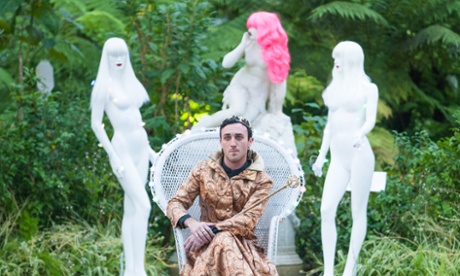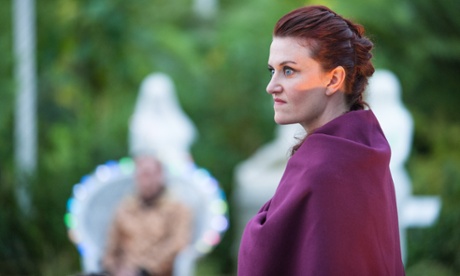
You wait 420 years for what might be the first professional Scottish production of Richard II, only to find it performed in a Victorian glasshouse by a cast of four. You also find Henry of Bolingbroke, the man who would be Henry IV, transmuted into a woman – an act that messes not just with Shakespeare but also with a key period of English history. By comparison, the insertions of Asleep by the Smiths and the occasional blasts of ELO are minor transgressions.
Oddly enough, it works. Jennifer Dick’s production for Bard in the Botanics is a tight, well-spoken political intrigue, streamlined down to the central players and performed in front of the king’s throne with the audience on two sides of a narrow playing area, as if privy to every palace secret.

Not that Richard’s homosexuality is much of a secret. Played by Robert Elkin, his jet-black hair setting off golden robes and silvery nail polish, he is more interested in canoodling with Adam Donaldson’s Duke of Aumerle than dealing with affairs of state. He is also whimsical: authoritarian one moment, weak-willed the next. You may be seduced by his sensuous rock’n’roll hedonism, but you’d be unwise to trust him. He is quick to cry and just as quick to stop. In opposition to the fierce-eyed Lady Bolingbroke (EmmaClaire Brightlyn) and the even-tempered morality of John of Gaunt (Finlay McLean), he is a feeble adversary, too self-pitying to earn respect. Brightlyn is the reverse: a steely warrior driven by honour, not anger. Revealing a tender heart, she makes you wish there had once been a great queen of that name.
Even if a flighty monarch who loses his kingdom in a bloodless coup is no match for Shakespeare’s better-known tyrants, Dick makes a persuasive case for a play about leadership, righteousness and characters propelled by the tide of history.
• At Glasgow Botanic Gardens until 1 August. Box office: 0141-429 0022.







